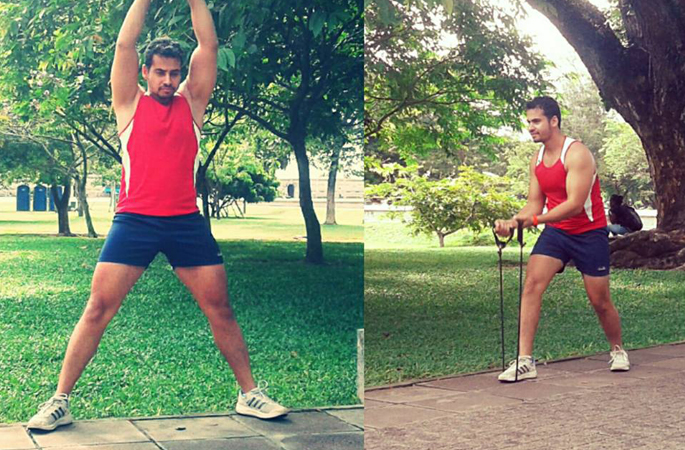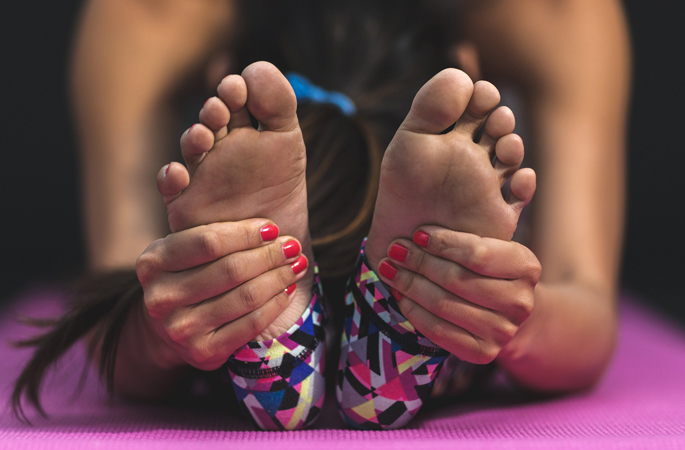Angelo Pereira is a fitness guru who developed the concept of FIT for Life, with the simple intention of planning one’s fitness journey, not for just one’s physical prime, but to continue for life.
A person should aim to be fit for the whole of their life, and fitness should be incorporated into one’s lifestyle. People should be making lifestyle choices with their wellness in mind which in turn allows for them to reach their targets and maintain those targets.
Results are sustainable when fitness is a lifestyle rather than a one-off trip to the gym. Over the last 2 years, Angelo has garnered a strong following of clients who swear by him and have come to embrace his concept of FIT for Life. Many have experienced the health benefits and results of working under his guidance and he is only getting started.
Q: Why and when did you start offering mass training sessions in public spaces in Colombo?
A: I commenced public sessions from the beginning of 2016. After my father passed away as a result of poor health brought on through primarily neglecting his own wellbeing, I made it a point to offer my assistance to anyone who was interested in getting their health on track. I focused on people over the age of fifty at first. Due to my experience of caring for my father, I was able to understand their strengths and limits and coach them safely. After supporting a few such friends, they encouraged me to do public classes and told me that I had a gift. I was somehow able to make them work hard and achieve their goals. They felt confident in my ability and vision, and I came to believe that more people would benefit from my insight.
Q: How do these fitness training sessions work?
A: The fitness classes take place twice a week with additional exercises programmed into one’s daily household routines. Clients are encouraged to also do exercises at home to supplement their workouts and nutritional advice is freely offered.
Workouts are not designed to kill you, but to give you a moderate challenge that will ensure you have sufficient strength to carry out your day to day work and remain active at home. You don’t want to be too tired to do your chores or look after your kids. That’s important!
Progress is tracked every 2 weeks, corrective action is recommended and discussions are held with the client on how to take the next step.
The goal is to ensure that you stay fit for the rest of your life and enjoy life to the fullest with great health to accompany you.
Q: How harmful do you think our sedentary, desk-located jobs are to our health?
A: Don’t get me started! Due to the lack of variation and requirement to stay seated during office or desk work, and limited mobility, you are training your body to stay put for almost the entire day. Most people try to work out every day for at least an hour.
But compare that with sleeping 7 hours of the day; sitting on your commute to work and working 9 hours of the day and then sitting while having meals for the rest of the time. You’re defeating the effect of your workout.
Where is the time to be active? Where is the time to walk or run in a park? Do some sports? So most often we push ourselves for an hour in a gym every day at a gym and are too tired as a result to do anything at home.
So you get no benefit from your workout and gyms know this and it helps their margins, which is why I push for being active at home.
Plus having irregular activity in your day to day life is not healthy! It can strain your heart to be dormant for a long time and then suddenly play soccer on the weekend or have a gruelling an hour at the gym.
Lack of mobility leads to muscles losing their functionality and some muscles becoming weak. The body in itself becomes weaker and lethargic. Further to this, the body becomes more susceptible to sickness as a result, and resilience towards injury and sickness is tremendously reduced.
Q: What do you think of the Fast Food Culture?
A: Fast food for a fast-paced life! That is how fast food came about, people had to eat fast food to keep up with their work schedules. By the way, a lunch packet is also a form of fast food as the nutritional value is not that high!
In addition to that, the habit of eating irregular meals is fueled by the unhealthy work schedules – which is why diabetes is on the rise in Sri Lanka.
All of the above have contributed to diabetes and heart disease affecting people even in their twenties or late teens. I get calls from companies that have realized this and want to have mandatory workout schedules for staff to keep them healthy.
Q: What are some specific health issues that are directly helped or even permanently solved by increased regular exercise?
A: Cardiovascular health and exercise are positively correlated. Everyone knows that when you have high cholesterol and high risk of heart disease, the doctors ask you to exercise.
Diabetes and blood pressure related complications have been found to be easier to manage when the patient is regularly exercising. Further, it is considered unusual for someone who is regularly exercising to have such problems, although it happens, it is considered unusual because it is unusual. People who regularly exercise stay healthy.
Improved blood circulation heals muscle damage, hence most aches and pains go away. Doctors themselves prescribe exercises for damaged joints and spinal injuries in the recovery programmes. So exercise is the answer.
Other areas of stress, depression, anxiety, insomnia, acne, respiratory difficulty, sexual inactivity and even bad breath have been found to be fixed with regular exercise.

Q: Which is more important, Movement or Nutrition?
A: Both go hand in hand. You can’t have one without the other.
You’ve got to eat to move. You’ve got to move to eat.
Q: What problems do people develop when they do not make the effort to incorporate regular exercise into their lives?
A: Worst case – high risk of diabetes and heart disease! Anyone who doesn’t regularly exercise is going to always feel weak and lethargic, leading to them always feeling tired. Surprisingly, this also results in such people not sleeping well and feeling restless – which is strange but it has to do with the toxins in the body playing up.
Most people think they have joint pains, but these are muscle ends hurting because of lack of mobility and flexibility. Low circulation of blood due to low activity also contributes to this.
I also mentioned earlier how one can be more susceptible to sickness if they workout very little. I for one very rarely get sick and even if I do, it doesn’t stay with me for long. This is primarily because I get a lot of exercise occupational hazard.
Q: What stands in the way of women and particularly Asian women becoming more interested in their physical fitness?
A: This is changing fast and most Asian women are hitting the gyms, parks and streets working on getting fit.
But there are still constraints, and judging from my clients and would-be clients, it’s their family and work commitments.
There is just no time in the day to workout. The ones who don’t work are heavily involved in looking after their children and keeping up with their household responsibilities and running the home. The ones who work, well, they work and still look after their kids.
Q: We know every individual is unique, but typically how long does it take a person just starting a fitness programme to see and feel the benefits?
A: On the first day itself, clients tell me they feel great. They love the fact that they used their bodies in ways they hadn’t for years. They feel the blood flow to areas that were neglected and that gives them a rush and some see this as a result worth celebrating.
I would say, within a week, clients feel more active and fit. Within about 2 to 3 weeks, they begin to feel their clothes loosen.
Within a month they are addicted to feeling this good and that’s the best part. Then the client begins to push themselves and that’s what you want. Then their fitness plan is sustainable.
Q: What advice would you offer people just starting to get their act together with fitness training, What should they watch out for?
A: I would remind them that they are doing this first and foremost to stay healthy and enjoy their lives to the fullest. So: never have a short-term plan but plan for the rest of their lives to be doing this for life.
Never settle for anything, always have greater ambitions for your fitness level. Many people start out by saying, this is how far I want to go and then they never sustain it.
Q: What are the best sorts of fitness activities for women of different ages and life stages? Can effective fitness programmes be developed for pregnant women? Is there evidence that regular exercise can stabilise health issues experienced by women?
A: So let me break this down into parts
What are the best sorts of fitness activities for women of different ages and life stages?
This goes for everyone, men, women and children of all ages and stages in life.It is functionality!
Do exercises that will ensure that you improve your functionality. What is the point of squatting 250 lbs and not being able to run 5 KM?
Or jump over hurdles? Or climb 6 flights of stairs for that matter?
I’m not saying training your body to lift is not good. But you will feel it later on in life if you haven’t trained your body to do basic functions at a younger age.
Q: Can effective fitness programmes be developed for pregnant women?
A: It depends on what you are trying to achieve. Let’s be realistic, a pregnant woman is not going to be able to run a race or play a soccer game; so that fitness level should not be the focus. Something to maintain her functionality and help her remain active during the day is the target and there are many programmes to achieve that.
But again it has to be considered with care. My advice, a pregnant woman should not be getting her exercise routine from a fitness instructor but a qualified Gynaecologist who knows her case which is unique and never generalized, and is qualified to offer direction that will guarantee the safety of the child and mother.
In the end, a pregnant woman should be focusing on the health and safety of her child first before her own fitness goals and only a qualified medical practitioner, a gynaecologist usually has the expertise to do so. Which is why I don’t train pregnant women, and I have turned down the opportunity to do so regardless of the client’s insistence.
Q: Is there evidence that regular exercise can stabilize health issues experienced by women?
Absolutely! Our bodies are made to move. When we do this, which is natural, many irregularities get fixed. There are exceptional circumstances and I am mindful of that when I comment, but in general, the answer is yes.
There are many documented cases of athletes overcoming injury; patients overcoming ailments and even physiotherapy in itself is a mild exercise which is medically prescribed.
“I have a vision for each of my clients and I want to see them get faster, stronger and look better every time I see them, while at the same time not push beyond their limits to ensure they never get injured. This is why I am yet to produce an unsatisfied client,” says Angelo Perera.
Good health is a lifelong gift, which greatly adds to the quality of our lives. We must treat our physical beings well, and invest in our health, with a sense of dedication and respect, to enjoy its benefits, rewards and dividends.
We at FemAsia wish all the very best to Angelo Pereira and his endeavours.



